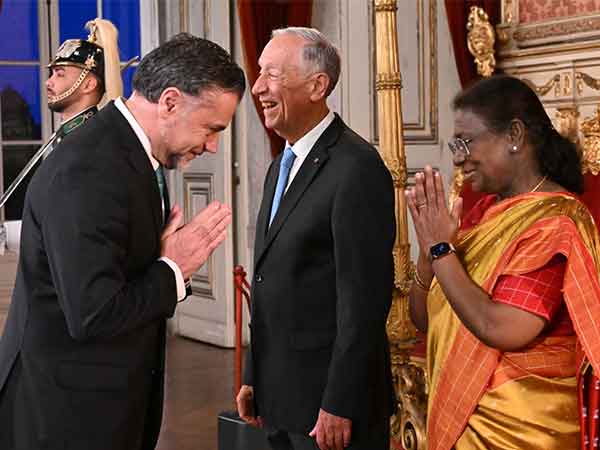India appeals Commonwealth nations to address climate action needs of Global South members
Sep 22, 2023

New York [US], September 22 : Emphasising that the world is increasingly facing climate-induced disasters, India has appealed to Commonwealth nations to address the climate action needs of its Global South members.
At the Commonwealth Environment and Climate Ministers Meeting in New York, MEA Secretary (West) Sanjay Verma underscored India’s G20 presidency and its contributions to securing climate finance.
The first Commonwealth Environment and Climate Ministers Meeting (CECMM) was held alongside the 78th Session of the UN General Assembly (UNGA 78).
"At the Commonwealth Environment and Climate Ministers Meeting in New York. Underscored India’s G20 Presidency and its contributions to securing climate finance. Commonwealth must now address the climate action needs of its Global South members," posted Verma on X.
India also said that it looks forward to reaching an ambitious climate finance goal from the floor of USD 100 billion, the Ministry of External Affairs said in an official statement.
India also presented the ambitious outcomes adopted by G20 towards climate action including an action plan on accelerating progress on the SDGs; A Green Development Pact that covers just and inclusive energy transition, sustainable lifestyles, climate finance, Ocean-based Economy, ending plastic pollution, disaster resilient infrastructure and a global biofuel alliance that seeks to expedite the global uptake of biofuels through facilitating technology advancements, the statement added.
The meeting provided an important opportunity for member countries to discuss ways to enhance action around climate change and the preservation of land, oceans and biodiversity. The discussions will also focus on strengthening implementation to enable Commonwealth member countries to achieve their Nationally Determined Contributions (NDCs).
India’s statement read, “We look forward to reaching an ambitious climate finance goal from the floor of USD 100 billion. As the needs are in trillions, the goal must be ambitious. Further, the quality of the goal, timeliness, affordability and accessibility are equally important.”
“Our world is increasingly facing climate-induced disasters. For many developing countries, climate change is looming large over their very existence. Urgent climate action is the need of the hour,” the statement added.
At CECMM, India said, that while developing countries have contributed little to climate change, they are the most vulnerable to climate-induced disasters, and also the most lacking in terms of capacity to deal with those disasters. Climate action by all countries is crucial. However, a serious discourse on means of implementation is necessary to tackle climate change effectively.
For countries, with tremendous development challenges, climate goals can be fully realized only with support in terms of finance, low-carbon technology transfer, and capacity-building, as envisaged under the UNFCCC and its Paris Agreement. It is disconcerting that developed countries have not fulfilled their commitment to jointly mobilize USD 100 billion in climate finance per year. The actual requirement of climate finance is in trillions, and is more immediate, India said according to MEA statement.
The Standing Committee on Finance (SCF) of the UNFCCC, has estimated that resources in the range of USD 5.8 trillion to USD 11.5 trillion are required till 2030 to meet the targets set by developing countries in their Nationally Determined Contributions (NDCs) and other communications.
Several proposals of India, which are in line with the needs and priorities of the developing countries, are under consideration in the Standing Committee on Finance -- including on definition of climate finance; nature and quantum of the New Collective Quantified Goal (NCQG); and making finance-flows consistent with Paris Agreement goals.
India, on its part, has actively contributed to the global fight against climate change and its impacts. India has consistently made ambitious commitments under the UNFCCC framework and acted on those commitments, the MEA statement added.
India has also pioneered, together with partner countries, global initiatives contributing to global climate action. These include the International Solar Alliance, Coalition for Disaster Resilient Infrastructure, Infrastructure for Resilient Island States, and Leadership Group on Industry Transition. India has also launched the Mission LiFE (Lifestyle for Environment) to bring individual behavioural change at the forefront of the global climate action narrative.
Climate Change has been a key priority of G20 under India’s presidency. Under the theme of ‘One earth, One family, One future’ India’s G20 Presidency has pushed for an inclusive, ambitious and action-oriented Climate agenda.
The meeting also received updates on various initiatives that support members’ delivery of their climate and environment commitments, such as the Commonwealth Living Lands Charter and Call to Action on Living Lands (CALL), the Commonwealth Climate Finance Access Hub (CCFAH), the Commonwealth Sustainable Energy Transition Agenda (CSET) and the Commonwealth Blue Charter (CBC), according to The Commonwealth.



















